TO

A BARRISTER
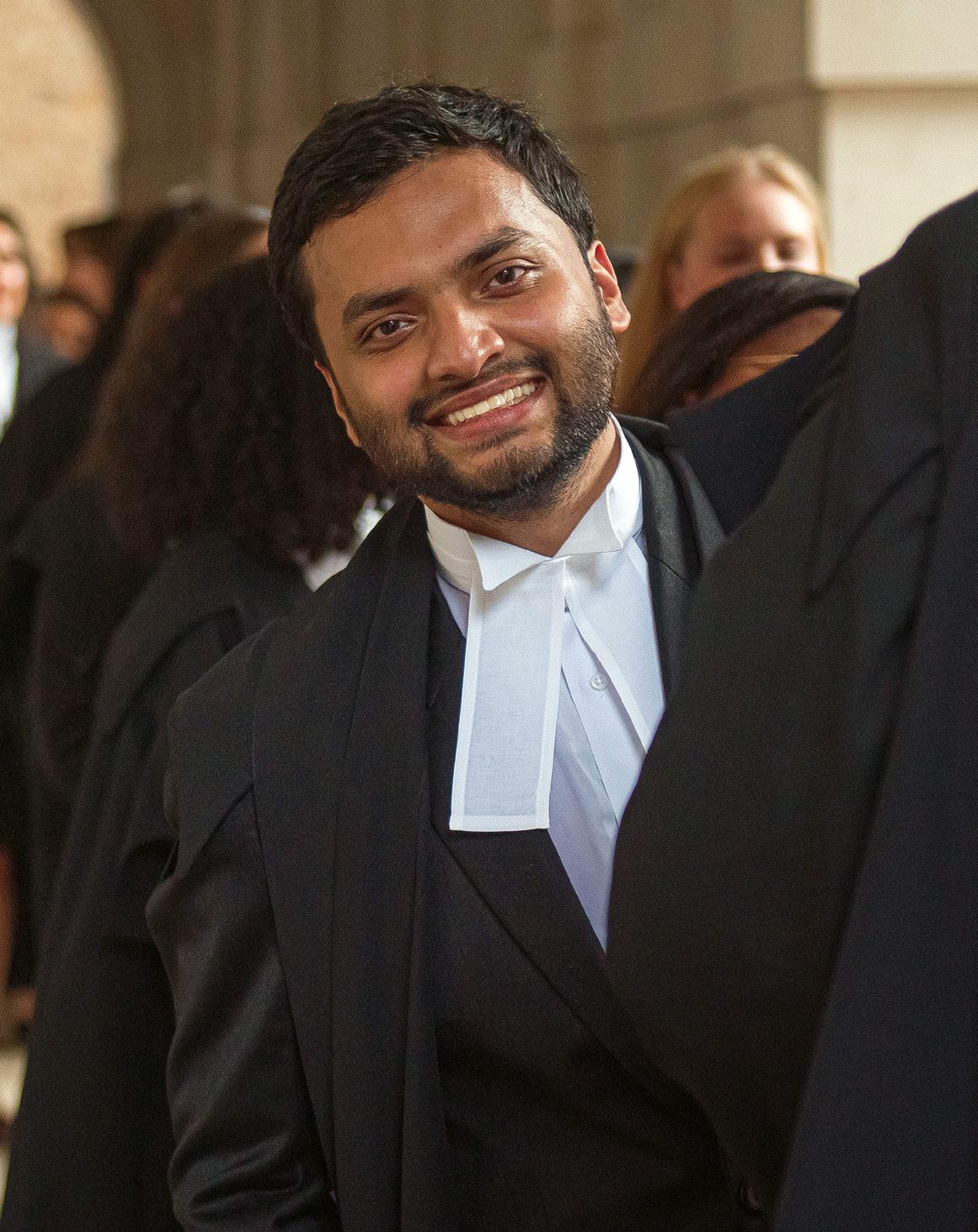
BECOMING GUIDE

Welcome to the Inner Temple
Facts and Figures About the Inner Temple
How You Become a Barrister
Support on your Journey to becoming a Barrister
Education and Support
Who’s Who in Education and Training
The Inner Temple Career Guide 2022–23 1 CONTENTS 02
04
08
14
26
33
WELCOME TO THE INNER TEMPLE
The first point of contact for those of you considering a career at the Bar is one of the four historic Inns of Court. This has been true for entrants to the Bar for over 600 years.

2
THE INNER TEMPLE
A fundamental feature of the Inner Temple is its focus on education and training, from student to established practitioner. The dedicated Education and Training Department is responsible for the training of student members of the Inn, alongside the approved education and training organisations that provide the vocational qualification component (formerly known as the BPTC/BVC), advocacy training for pupils and new practitioners as well as the provision of continuing professional development (CPD) courses.
For student members, the Inn organises many educational Qualifying Sessions including residential weekend courses, staffed and directed by its senior members, lecture nights and various vocational workshops such as those on presentational skills. All of these enable students to qualify for Call to the Bar. With regular opportunities to meet and learn from members of the judiciary and the practising Bar, the Inn has a reputation for its approachability and friendliness. We are committed to helping you through the early stages of your journey to the Bar.
The Department is also responsible for awarding scholarships for the law conversion course, vocational qualification component, disability grants and internships. The Inn has a strong commitment to supporting promising students from all walks of life and to giving financial assistance where appropriate to ensure that the cost of becoming a barrister is not a barrier.
Making an Informed Decision
If you are intending to pursue a career at the Bar, it is important that you are familiar with statistics regarding the number of people also looking to pursue a career at the Bar, as well as the academic qualifications that will be required (see page 10). This will ensure that you make informed decisions about your future career.
Project Pegasus
Work has now completed on Project Pegasus, a vital development and refurbishment of the Inn's main (Treasury) Building and Hall. Project Pegasus has created an attractive, flexible space with state-of-the-art facilities for the delivery of education and training programmes for students, pupils and practitioners to the support the activities of the Bar for generations to come.
The revitalisation of Inner Temple will secure the long-term future of the Inn, ensuring members and other people who use the Inn have the services and facilities to support a vibrant legal profession. You can find out more about the Inn’s refurbishment at www.innertemple.org.uk/ project-pegasus
3The Inner Temple Career Guide 2022–23
FACTS AND FIGURES ABOUT THE INNER TEMPLE
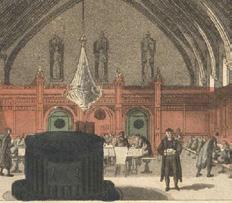
First recorded history of land called the Temple when it was acquired by the Knights of the Temple of Solomon of Jerusalem (Knights Templar).
History of the Inner Temple Characteristics of Pupils

The order of Knights Templar abolished and their property seized on the orders of Pope Clement V for alleged malpractice.

First record of lawyers occupying the Temple when Wat Tyler’s followers destroyed their lodgings and burned their records.
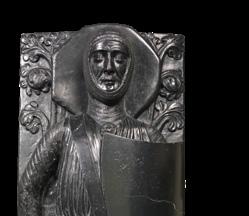
The earliest surviving register of Inner Temple admissions.
The Inner Temple is a strong and diverse community. Our outreach initiatives look to provide realistic careers advice and guidance so that you can make the right choice for you. It is essential that you have a realistic prospect of obtaining pupillage before starting the vocational qualification component.
Gender and Race
In recent years, more females than males have been taken on as pupil barristers, with a high of 62% in 2007–08. Over the same period, an average of 15% of pupils were from ethnic minority backgrounds.
Undergraduate Education
A law degree remains the leading entry qualification into the Bar, but significantly less so than in the past. A high of 48% of Inner Temple pupils in 2015–16 graduated in non-law degrees and subsequently completed the law conversion course. This is compared to 33% in 2004–05. However, high academic merit remains the leading factor in progression to pupillage.
It has become increasingly difficult to obtain a pupillage with a lower second class degree. On average, around 4% now gain pupillage with a 2:2, the majority of whom will have a number of years of work experience.
The Inner Temple Career Guide 2022–234
1160
1312
1381
1505
62% FEMALE 15% BAME 4% 2:2 ACCEPTED 48% 33% NON LAW DEGREE
Image credits (Above L–R): A medieval effigy of Knight William Marshal, Earl of Pembroke in the Temple Church / Pope Clement V © public domain / London's mayor, Walworth, killing Wat Tyler © public domain / The Temple Hall © The Inner Temple / King James I of England painted by John de Critz © public domain / The Rt Hon The Baroness GBE PC © Birkbeck / Dr Ivy Williams © Getty Images
1608

James I grants the Temple to the Benchers of the Inner and Middle Temple. The grant is of the whole Temple site, including the Temple Church and other buildings, and is made to the Benchers of each of the two Inns by name.

1919
Membership of the Inns opened to women.
1922
Ivy Williams, the first female barrister, called to the Bar by the Inner Temple.
1988
The Rt Hon Baroness ButlerSloss, first woman to be appointed to the Court of Appeal. She was also the first female Treasurer of the Inn, in 1998.

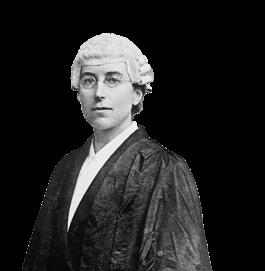
2008
400-year anniversary of the Inn’s first Royal Charter.
Application/Award Statistics
The Inner Temple is a strong and diverse community. Our outreach initiatives look to provide realistic careers advice and guidance so that you can make the right choice for you. It is essential that you have a realistic prospect of obtaining pupillage before starting the vocational qualification component.
The Inner Temple Career Guide 2022–23 5
Bar Course Scholarship Statistics 2017 2018 2019 2020 2021 2022 Applicants 393 442 453 447 493 395 Interviewed applicants (minus withdrawals) 331 383 384 393 442 354 Total Awards 101 100 110 133 129 142
WHAT IS AN INN OF COURT?
Anybody who wishes to be Called to the Bar of England and Wales must join one of the four Inns of Court.
The four Inns of Court have distinct histories, coming into being around the middle of the 14th century. The Inns held sole responsibility for legal education and therefore acted as gatekeepers to the profession. While much of this responsibility has been devolved to higher education institutions, the Inns continue to play an essential part in education and training for the Bar.
The Inns of Court also continue to hold exclusive rights of admission to the Bar. This process, known as ‘Call to the Bar’ or ‘Call’, occurs after you have successfully completed the academic and professional training components. This includes a programme of professional development activities at your Inn known as ‘Qualifying Sessions’.
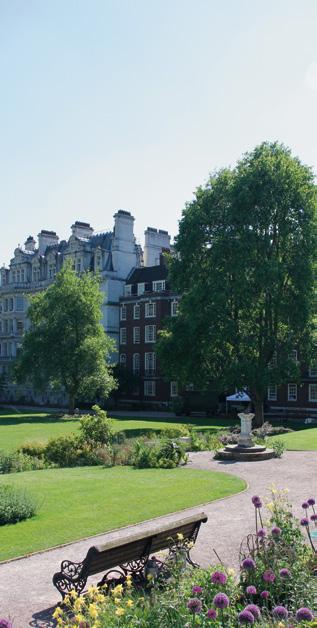
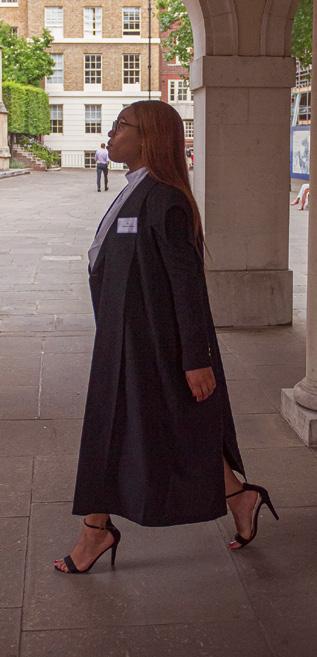
However, Call does not entitle you to practise as a barrister as you must first complete a year of pupillage –a form of apprenticeship – and hold a practising certificate.
Students wishing to train for the Bar may choose which Inn to join, but can only apply to one Inn for scholarships.
The Inns provide a great deal of valuable financial assistance for the various stages of becoming a barrister (see ‘Financial Assistance’ on p20–21).
Each Inn has three standard groups of members: students, barristers and Masters of the Bench, or ‘Benchers’. Masters of the Bench form the governing body of the Inn and new Benchers are chosen from existing members in addition to honorary members, such as legal academics and usually at least one member of the Royal Family.
The senior Bencher of the Inn is the Treasurer, a position held for one year. The Under or Sub-Treasurer is the acting chief executive of the Inn. The General Council of the Bar (‘Bar Council’) and the Bar Standards Board provide other representation and regulatory functions for the profession.
The Inner Temple Career Guide 2022–236
JOINING THE INNER TEMPLE
When do I have to join an Inn?
You can join an Inn of Court if:
You are studying or have completed a qualifying law degree
You are currently studying or have been accepted onto a law conversion course
You have been exempted from or have successfully completed the academic stage of training
Depending on the pathway to qualification you are following, you will have a specific point at which you need to join an Inn of Court. This is a requirement of the Bar Standards Board.
Please note that you can only apply to join one Inn. The admission fees vary across the Inns, but the Inner Temple’s fee is £100.
How?
You can access an application form from www.innertemple.org.uk
The Treasury Office is happy to give prospective students advice on completing their application. Please call 020 7797 8250
LIBRARY FACILITIES & SERVICES
The Library is housed on the second floor of the Treasury building. It is open to all members of the Inner Temple and to members of the other Inns of Court. It is a legal reference Library, staffed by experienced information professionals, which offers users access to a range of print and electronic resources in a comfortable working environment.
The Library supports the Inn’s members throughout their careers. Students are offered qualifying sessions on basic and advanced legal research. Pupils receive inductions on Library services and training on legal research to assist them in preparing for pupillage. A series of database training sessions help practising barristers to keep up to date with developments in online research.
The Library offers an inclusive and accessible space with authoritative resources in an environment that is conducive to study and wellbeing.
More information on the Library’s collections, services and contact details can be viewed at www.innertemplelibrary.org.uk
Other Facilities at the Inner Temple
The Inner Temple’s historic grounds, which include six Grade I listed buildings, are in the heart of the legal district in London, close to the Royal Courts of Justice and St Paul’s Cathedral.
Our extensive estate is predominantly rented out to barristers’ chambers.
The Gardens
The Inn benefits from three acres of beautiful gardens. The Inner Temple Garden is usually open daily between 12.30pm and 3pm throughout the year.
Temple Church
On the north side of our Hall is one of the most historic churches in London. Founded by the legendary Knights Templar, the Church was consecrated in 1185 and has stood throughout the Crusades, the founding of the Anglican Church and the World Wars. In addition to being renowned for church music, it is also a site for contemporary legal debates. During the 400th Anniversary celebrations, an important series on Islam and English Law was held in the church.
The Inner Temple Career Guide 2022–23 7
YOU
A BARRISTER
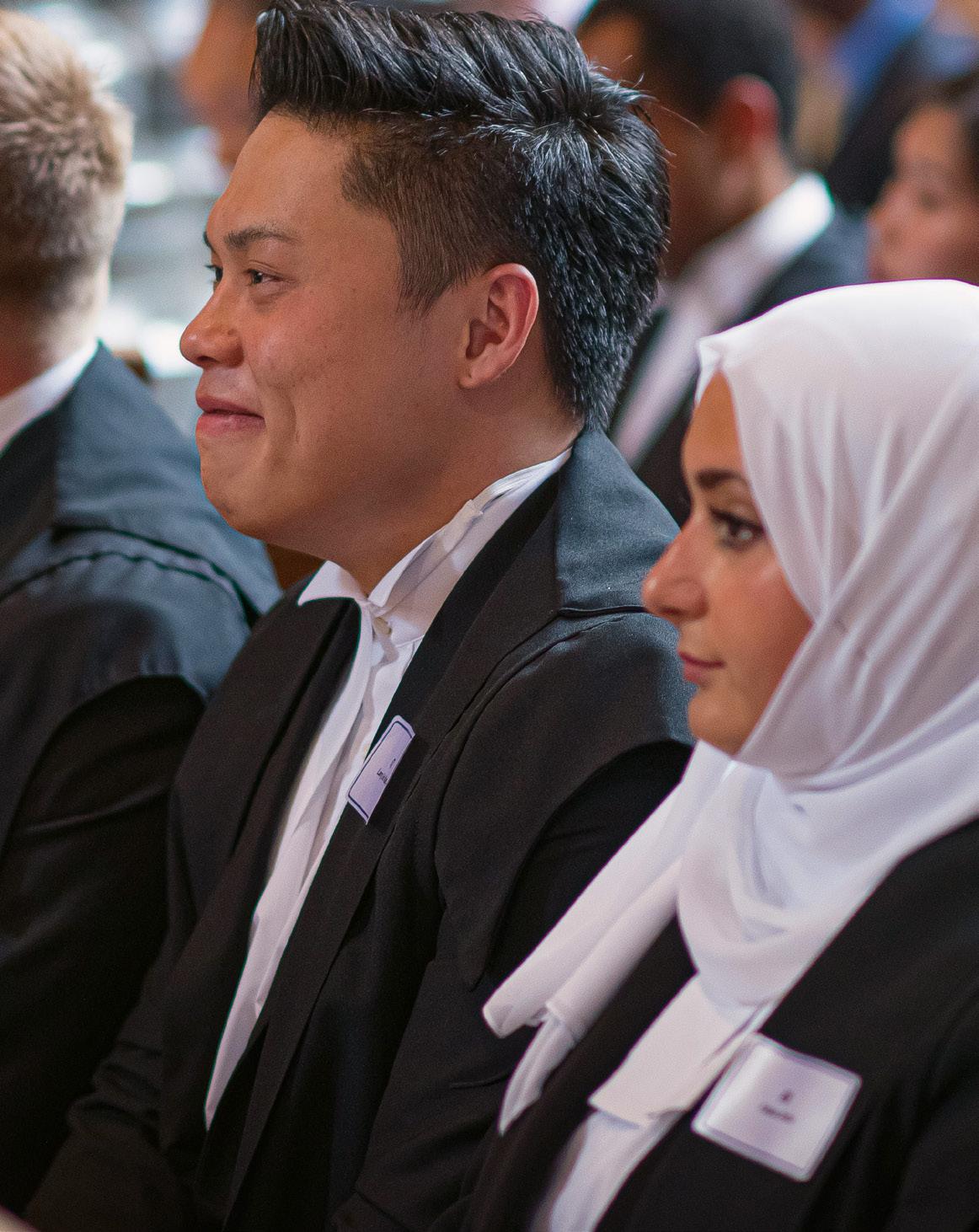
BECOME HOW
8
WORK EXPERIENCE AND MINI-PUPILLAGES
Mini-pupillages
Before committing yourself to a career at the Bar, it is helpful to get an idea of what the profession entails on a day – to-day basis. The best way of doing this is by undertaking work experience in chambers. Formal placements are known as ‘mini-pupillages’. These are short placements, normally between two and five days in duration, that will allow you to shadow one or more barristers in order to get an idea of their practice area. Activities might range from reading and discussing case papers to attending conferences or court proceedings.
Undertaking a range of mini-pupillages in various sets of chambers will also expose you to different practice areas,
helping you to decide which areas you might want to specialise in. Even if you know which practice area you want to specialise in, it is recommended that you see a variety of chambers – both in London and on Circuit. Undertaking ‘minis’ are essential for Inns of Court scholarship and subsequent pupillage applications, as they demonstrate your dedication to a career at the Bar. You should seriously consider undertaking at least three mini-pupillages before beginning the scholarship or pupillage application processes.
Some chambers require applicants to undertake a mini-pupillage at their set of chambers in order to be eligible to apply
to them for pupillage. If this is the case, be mindful of deadlines so that you do not miss out on doing a mini-pupillage at that particular set of chambers. Other sets will assess the mini-pupillage and use it as part of their selection criteria. Assessments will vary, but may be in the form of a written submission or participation in a mock conference.
Visit the mini-pupillage hub at www.chambersstudent.co.uk/the-bar/ mini-pupillage-vacancies in order to find out which chambers offer minipupillages. From there, you will be able to visit the websites of the chambers which interest you to find out their application process.
Other work experience
Aside from mini-pupillages, there are many other types of work experience that can be valuable. Work experience in solicitors’ firms will not only help you make an informed choice about which branch of the profession you wish to enter, but also give you a wider view of the legal profession as a whole. Other useful forms of legal experience include volunteering at a Citizens Advice Bureau or law centre, marshalling (shadowing a judge), or taking on cases via the Free Representation Unit. If you decide to
take a year out to strengthen your CV, you may be able to work as a paralegal, a judicial assistant or a research assistant.
Non-legal work experience, even just casual or part-time work, should also be mentioned on applications as it can show development of relevant skills. Volunteering and positions of responsibility can be relevant to your future practice as a barrister, especially if it involves a public speaking element.
Any experience, whether sitting in your local court or participating in a debating competition, can potentially help strengthen your applications, so make sure you learn as much as you can from each experience and be prepared to talk about it at your interview.
The Inner Temple can support you through our outreach activities to access work experience. Find out more by reading on.
The Inner Temple Career Guide 2022–23 9
THE STAGES OF BECOMING A BARRISTER
What do the pathways cover?
All the four pathways cover the following components of education and training for the Bar.
This comprises: academic component (degree); vocational component (formally the Bar Professional Training Course); pupillage/work-based learning;
After the academic stage, students will continue to be required to pass a computer-based Bar Course Aptitude Test (BCAT) which is designed to show how likely it is that they will succeed in the next level of training.
THE FOUR DIFFERENT PATHWAYS
To become a barrister, you will have to follow one of four different pathways. A summary of these pathways is below:
1 Three-Step pathway:
Academic, followed by vocational followed by the pupillage/work-based components.
Students should complete an academic degree which could be either a law degree or a non-law degree. Students on a non-law degree will need to complete a Graduate Diploma in Law.
After the academic component is completed, students must join an Inn of Court, pass the Bar Course Aptitude Test and meet the English Language Requirements.
Once you have completed these requirements, you can start a vocational component course which is normally 9 months long. This vocational component will include BSB centralised assessments on subjects such as Civil Litigation, Criminal Litigation, Evidence and Sentencing. It will also include skills training on subjects including Advocacy, Option Writing and Legal Research and Professional Ethics.
You will be assessed on these skills subjects by the organisation running the vocational component. You must also complete Qualifying Sessions with your Inn.
A number of organisations can offer the vocational component combined with an LLM.

Once you have completed Part 2, completed the Qualifying Sessions and undergone the necessary criminal record checks, you will be eligible to be called to the Bar. You will also have to have completed pupillage/ work-based learning before being able to be authorised as a practising barrister.
2 Four-step pathway:
Academic component, followed by vocational component in two parts, followed by pupillage/ work-based components.
Students should complete an academic degree which could be either a law degree or a non-law degree. Students on a non-law degree will need to complete a Graduate Diploma in Law.
After the academic component is completed, you’ll need to pass the Bar Course Aptitude Test and meet the English Language Requirements.
Once you have completed these requirements, you can start a vocational component course which under this pathway will be in two parts.
Part 1 would consist of the knowledge-based parts of the course – civil and criminal litigation and evidence, which are centrally examined by the BSB. Candidates would be able to prepare for Part 1 either independently or on a formal course.
Only those who pass Part 1 would then be able to proceed to Part 2 which will consist of the remaining skills-based elements. You must then join an Inn of Court before starting part 2.
Once you have completed part 2, you can be Called to the Bar. You will also have to complete pupillage/work-based learning before being authorised as a practising barrister.
The Inner Temple Career Guide 2022–2310
Students must be admitted to one of the Inns of Court and Inns of Court continue to be responsible for the fitness to practise test and for Calling students to the Bar. Students will be required to complete Qualifying Sessions at their Inn of Court before being Called to the Bar.
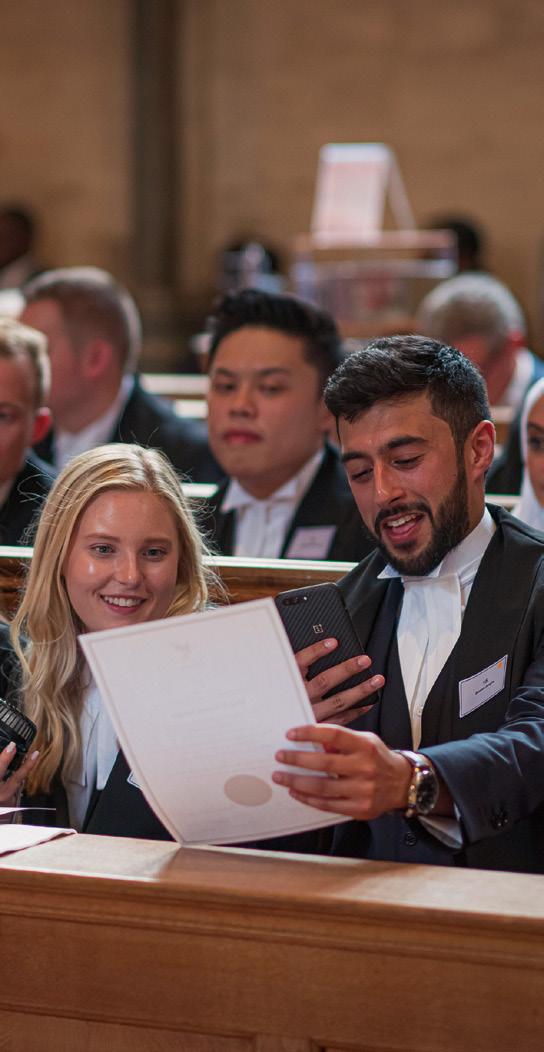
They are also required to undergo a DBS check and, if necessary, the equivalent international checks in advance of the ceremony. All required checks must be issued through the Inn. Previously obtained checks outside of the Call to the Bar process cannot be used
3Integrated academic and vocational pathway
Combined academic and vocational components followed by pupillage/work-based component.

Under this pathway you will be able to combine the academic and vocational components together normally as part of a degree or a degree followed by a Masters year.
You will need to join an Inn of Court before you start the vocational component and so it is worth checking with the organisations running the course when this will be.
You will still need to complete Qualifying Sessions and meet the English Language requirement, Bar Course Aptitude Test and you will have to complete assessments run by the organisations and the BSB centralised assessments.
Once you have completed this integrated part of the pathway and undergone the necessary criminal record checks, you will be eligible to be called to the Bar. You will also have to complete pupillage/work-based learning before being authorised as a practising barrister.
4 Bar apprenticeship or another integrated modular pathway
The route of training most similar to (higher) apprenticeships will also be permissible under the Bar Standards Board regulatory framework
The Inner Temple Career Guide 2022–23 11
CALL TO THE BAR
Call to the Bar is not only your ‘graduation’ upon completion of the academic and professional qualification components, it is also an important stepping stone to your career. The Legal Services Act 2007 defines a barrister as “an individual who (a) has been called to the Bar by an Inn of Court, and (b) is not disbarred by order of an Inn of Court”. Call is the conferral of the ‘Degree of the Utter Bar’ and the title ‘Barrister’. The degree is conferred on those who have completed the required academic, vocational and Inn’s qualifying session stages of qualification, and who have satisfied the Inn that they are fit and proper to be called to the Bar.
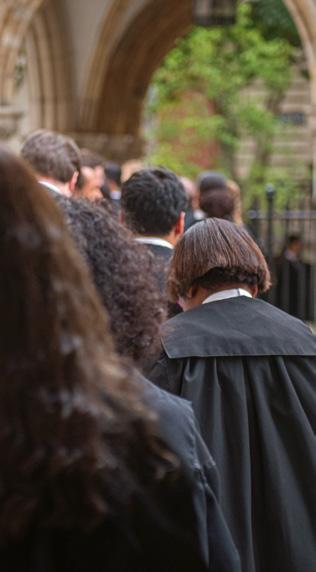
Inner Temple hold four Call ceremonies each year:
Hilary (March) Trinity (July)
Deferred Trinity (October)
Michaelmas (November)
The ceremony itself is normally held in the historic setting of the Temple Church, built in the 12th Century by the Knights Templar. While the organ plays, students process down the aisle shortly followed by the Masters of the Bench. During the ceremony, students are called to the Bar by one of the Masters of the Bench with the Treasurer awarding students their certificates in front of guests. Afterwards, there is a champagne reception with a live band and a chance for students and their guests to celebrate. The Hilary Call has a similar structure, however the ceremony is conducted in the Hall.
We always aim for Call to the Bar to be a joyous occasion for students, and their families and friends, to set them off properly on their journey to becoming a barrister.
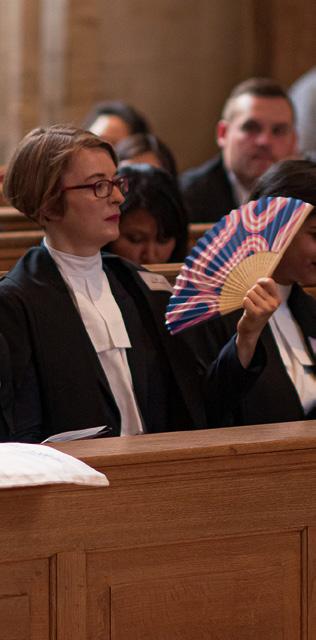
12 The Inner Temple Career Guide 2022–23
THE EMPLOYED AND SELF-EMPLOYED BAR
There are two main contexts in which barristers practise: the one that you are most likely familiar with is the self-employed Bar, where barristers are based in chambers. The lesser known option is the employed Bar, where barristers work as part of an organisation.
Although most barristers are selfemployed, this doesn’t mean that there is a better or worse way of working: the perceived positives and negatives will depend very much on your working style.
Approximately 80% of barristers are self-employed, taking control of all aspects of their work, such as the areas in which they practise and their working hours. Carolina Bracken is a barrister at 5 Paper Buildings, practising in general crime and trading standards.
According to Carolina, one of the main benefits to be gained from working at the self-employed Bar is having “far more control over the direction of your practice… If you finish in court early, and would rather take the afternoon off and work in the evening, you can make that decision”. However, this level of freedom may not be best suited to those who prefer a more structured approach, and Carolina warns that although, “your time is your own, you must be able to manage it effectively”. The culture of chambers and the free flow of information is another important advantage: “You are able instantly to tap into the collective experience of all members who are more senior than you, and the relationships you build with your supervisors and others in chambers can be as valuable a source of work as your contacts with solicitors.”
Despite these benefits, there are elements of the employed Bar that Carolina would love to integrate into her own practice.
It is important to emphasise that a barrister’s experience of chambers will also depend on their practice area(s). Changes to legal aid in recent years mean that some of those practising in the areas most affected have been attracted to the relative certainty of life at the employed Bar. The comfort of a salary is an undeniable attraction for many.
The Employed Bar
While the majority of barristers are self-employed, there are a number of opportunities to practise within a larger organisation. Some of the institutions offering such opportunities are:
Government Legal Service Crown Prosecution Service
Armed Forces
Law Firms Commerce, Finance and Industry
The experience of working at the employed Bar will be markedly different from working in chambers. Hannah Smith is a barrister at Edward Hayes LLP, a criminal law firm with an international reputation. From her perspective, practising in this context offers the opportunity to strike a healthier balance between your professional and personal life:
“
You are unlikely to be given work at short notice, particularly work that requires much preparation, so your evenings and weekends are generally workfree”. Earning a salary adds stability, and some organisations will cover a barrister’s expenses. Hannah explains that Edward Hayes covers the expenses that she incurs in the course of her work such as, “travel, textbooks, etc.”
Additional features such as maternity/ paternity leave, sick pay, annual leave and pensions are also available at the employed Bar.
Having undertaken pupillage in chambers, Hannah can appreciate that there are also benefits to be accrued from working in this context that cannot easily be replicated at the employed Bar, such as the close proximity to a range of more experienced practitioners that can provide advice and support, if needed.
The Inner Temple Career Guide 2022–23 13
ON YOUR
BECOMING A BARRISTER
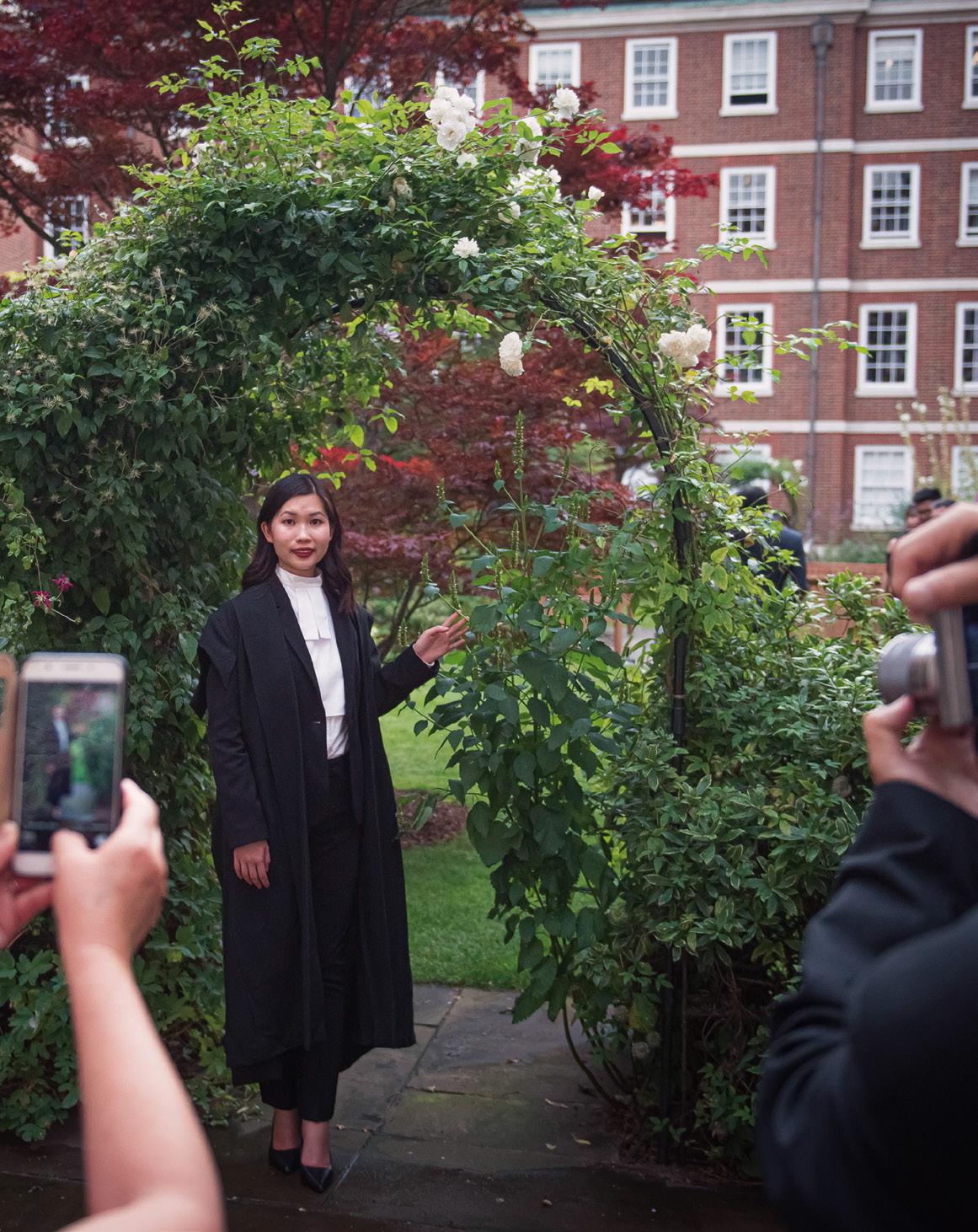
JOURNEY SUPPORT
TO
14
OUR OUTREACH SUPPORT
Inner Temple Schools Project
The Inner Temple launched a pioneering Schools Project in 2008 to ensure that all students, regardless of their background or networks, are aware of the opportunities available to them at the modern Bar. It recently featured in the Milburn Report on Fair Access to Professional Careers.
The programme consists of a number of events throughout the year for school students in years 12 and 13. These events include talks from members on different areas of law, legal case exercises, a debating tournament and opportunities to interact informally with practising barristers.
The project was launched in conjunction with the National Education Trust (NET), and now also works with the national Pathways to Law programme. Pathways supports high achieving state school students into law faculties and the legal professions.
In 2021, the Inn was delighted to launch a new suite of digital resources for school students aged between 14-16, their parents/carers and their teachers in partnership with the Open University. These resources are interactive, enabling students to learn about what a barrister does on a day-to-day basis, different practice areas at the Bar, the role of the Inns of Court and the academic
requirements of the role. You can find out more and access these resources by following these links:
Learning about barrister: https://bit.ly/3G04Aqj
Support an aspiring barrister: https://bit.ly/31dtm7K
For School Teachers
If you would like a barrister to give a talk to your school students, please contact the Bar Council: careers@barcouncil.org.uk regarding the ‘Speak Up for Others’ Scheme.
Insight Evenings: Becoming a Barrister
The Inner Temple hosts a series of events around England and Wales that aim to give an insight into the profession. Hear from practising barristers and judges about their path to the bar and join us for a networking reception afterwards, where you can interact with barristers, judges and staff from the Education and Training department.
The Insight Evenings are an opportunity for university students, graduates and career changers to ask questions and learn more about their prospective careers.
In Focus
The In Focus series aims to have open and frank discussions with members and prospective barristers about issues that underrepresented groups in the profession may face, and to discuss the progress being made and the distance to go. Previous events have included Being LGBT+ at the Bar and Disability at the Bar.
The format of the event is a roundtable to encourage attendees to share their experiences if they feel comfortable doing so. The roundtable is followed by networking. All In Focus events are hybrid events, allowing in-person or online attendance.
Chat to Us
In 2021 The Inner Temple launched a new online chat platform in collaboration with The Ambassador Platform. Through this, prospective Bar Course and GDL students can chat to our student ambassadors to find out more about the realities of the courses, and have their questions answered. To find out more and chat to our student ambassadors, visit our website www.innertemple.org.uk/ becoming-a-barrister/how-to-getinvolved/chat-to-us/
The Inner Temple Career Guide 2022–23 15
PEGASUS ACCESS AND SUPPORT SCHEME (PASS)
PASS is a leading programme designed to support aspiring barristers who have not yet started the vocational qualification component.

PASS was established by the Inner Temple (one of the Inns of Court) and many different partner chambers across a range of practice areas. We aim to find you a mini-pupillage in chambers and cover the associated travel and accommodation costs.
If you’re on track for a 2:1 or higher, this programme might be for you.
We’re looking for candidates who have attended a UK state school and who meet at least one of the following criteria:
Recipient of free school meals
First in their family to attend university
Had parent(s) who received income support
Care leaver
Our promise:
Priority access to one-to-one CV and interview advice from the Inner Temple Outreach team
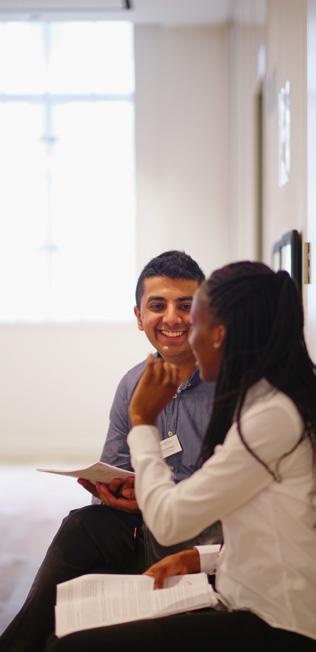

Free priority booking onto all Inner Temple outreach events, including Dinner to the Universities
Skills development days to enable you to apply for scholarships, to find out how chambers really work and to develop your CV
An opportunity to participate in the COMBAR scholars scheme (see combar.com for more information)
Applications nomrally open in June. Find out more at innertemple.org.uk
The Inner Temple Career Guide 2022–2316
question and answer exchange through
Platform
named staff for those from
backgrounds
Days for school students
Dinner to the Universities
We’ll visit you: Next Steps Sessions
or on campus
Funding for Bar Societies
Pegasus Access and Support Scheme
Online groups for those from underrepresented backgrounds
Introduction to De-mystifying the Barrister Profession. An introduction for teachers, personal tutors and careers advisors
Funding for Academic Fellows to run events about becoming a barrister (Pending review by Dean)
The Inner Temple Career Guide 2022–23 17 OUTREACH OVERVIEW Service Before 16 16 to 18 University students and graduates Gatekeepers (e.g. teachers, careers advisors) Careers guide X X X X Website X X X X Online learning resource X X X X Interactive
The Ambassador
X X X X Specific
underrepresented
X X X X Discovery
X Insight Events X Next Steps Sessions X X
X
online
X X
X
X
X
X
X
REFLECTIONS ON THE PEGASUS ACCESS AND SUPPORT SCHEME
Douglas Wotherspoon
Douglas Wotherspoon joined PASS whilst studying Law LLB (Hons) at the University of Manchester. He was a recipient of an Inner Temple Major Scholarship and the Duke of Edinburgh Entrance Scholarship. He went onto secure pupillage at 9BR and is now a practicing barrister. He wrote the following after completing PASS.
I was recommended the Pegasus Access and Support Scheme (‘PASS’) by a fellow student at the University of Manchester. He had completed the programme the year before and was overwhelmingly positive about PASS and his experience. Notably, he was particularly complimentary towards Inner Temple’s approach to diversity and inclusion. I came to the law from two concurrent unconventional careers, an unconventional background, and later in life than some. What immediately stuck me about Inner Temple was a genuine effort to encourage and support everyone, regardless of background, to achieve their potential. I recognised immediately that Inner Temple would be inclusive and welcoming as a professional home and applied to PASS.
Following my successful application, I was placed on a mini-pupillage at Ely Place Chambers. I was fortunate enough to see a wide range of chambers’ work from sitting with a third six pupil in Shoreditch County Court to shadowing a 27 years call senior junior at Maidstone Combined Court Centre. Notably, I attended the High Court for an injunction hearing which was reported nationally the following day. The take-away moment for me was a piece of advice imparted outside Watford Employment Tribunal which helped shape not only my undergraduate module selection, the type of set I applied to for pupillage, and ultimately my future area of practice.
In addition to a mini-pupillage, another opportunity provided by PASS was the residential weekend. The weekend provided valuable tutelage on pupillage and scholarship applications, mock interviews, networking sessions, and opportunities to socialise with other Scholars, Members, and Benchers of Inner Temple. Each experience highlighted the collegiate and supportive environment of the Inn.
The highpoint of the weekend for me was submitting a plea in mitigation to Her Honour Judge Sarah Munro QC and the feedback which followed. I would not have had any of the above experiences if it was not for Inner Temple and PASS.
I applied for a scholarship during my final year at university. The application process involved a written application and an interview. The interview took place at Inner Temple. Upon arrival, the other candidates and I were taken to the library and given time to read and prepare notes on our choice of a civil, family, or criminal case before being separated and taken to our individual interview rooms. The interview itself comprised of a series of questions from four members of Inner Temple. The questions were centred on my application, the case which I had just read, and my motivations for becoming a barrister. There also was a short advocacy exercise.
Every applicant for a scholarship at Inner Temple is granted an interview. This affords everyone equal opportunity to show their determination, ability, and character regardless of the strength or weakness of their written application. This is an advantage for anyone who has prepared by reading cases, is abreast of current legal issues, and knows their written application back to front.
The Inner Temple Career Guide 2022–2318
Without the support of Inner Temple, it would have been very unlikely that I would have been able to fund the BPTC. The experiences and the insight provided by PASS me helped to secure a Major Scholarship and a Duke of Edinburgh Entrance Scholarship allowing me to undertake the BPTC full timeimmediately after my LLB. I am looking forward to starting a new chapter on my journey and becoming more involved with Inner Temple during my BPTC year.
I applied for pupillage during my final year at university and was similarly successful. Again, I was able to draw upon my experiences during PASS whilst drafting my written applications, at interviews, and during advocacy exercises. If you are eligible to apply for PASS, I would encourage you to do so, it has provided me with confidence, insight, and experiences which I would not have had otherwise and gave me a link with Inner Temple which will remain throughout my career.

19The Inner Temple Career Guide 2022–23
SCHOLARSHIPS
The Inner Temple is proud to be able to offer financial support to our student members as they embark on a career at the Bar. We are fortunate to be able to do this through the income generated by the Inn and from funds provided by the generosity of our members, past and present, and benefactors.
For 2023 the Inner Temple intends to offer £2,080,808 across the different scholarships available.
The scholarship means that I am able to access the Bar and become barrister regardless of my underprivileged background. It represents my hard work, resilience and determination to thrive at the Bar.
Roheema Yasmin, 2022 Bar Course Scholar
The Inner Temple has a variety of scholarships available during the different stages of your journey to the Bar:
GDL Scholarships
Available to those who are completing a law conversion course.
Bar Training Course Scholarships
Available to those who are going on to start the Vocational Component of their Bar Course Training.
Disability Awards
Available to disabled members who are completing a Bar Course or currently on pupillage.
Internship Awards
Available to members undertaking the Bar Course and those in practice. Pupillage Awards
Available to members who are on minimally funded pupillages to help top up Chambers’ pupillage grants.
Pegasus Scholarship Trust Award
Available to members of all four Inns in their first five years of practice.
The Inner Temple Career Guide 2022–2320
The Inner Temple Career Guide 2022–23 21 Scholarship Type Open for applications Deadline When should you apply? How do I apply? GDL Scholarship Award March 2023 May 2023 The Spring before your law conversion course starts Online application form Bar Course Scholarship Award Tuesday 20 September 2022 1pm on Friday 4 November 2022 The Autumn before you start the Bar Course Online Application Form Disability Award Throughout the year No deadline After you have received a decision from DSA Download application form from website Internship Awards March 2023 June 2023 From the Spring of starting your Bar Course Online application form Pupillage Awards March 2023 April 2023 From the April before your pupillage starts or during your pupillage Online application form Pegasus Scholarship Trust Awards November 2022 December 2022 Within the first five years after completing pupillage Online application form
Application Form
In order to apply for a scholarship, you will be required to submit an online application form, which you can access via the Inner Temple website when the application portal is open. The application form is broken down into 6 sections – contact information; educational details; legal and nonlegal work experience; supporting information; references and equality monitoring. The ‘supporting information’ section includes professional statement/ essay style questions, which are specific to the scholarship you are applying for. Please note that if you submit an application, you will be asked to provide details on your financial circumstances in January 2023, via a separate form within the scholarships portal.
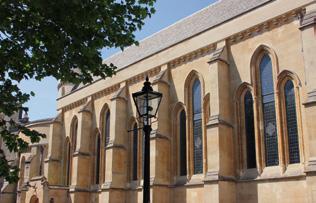

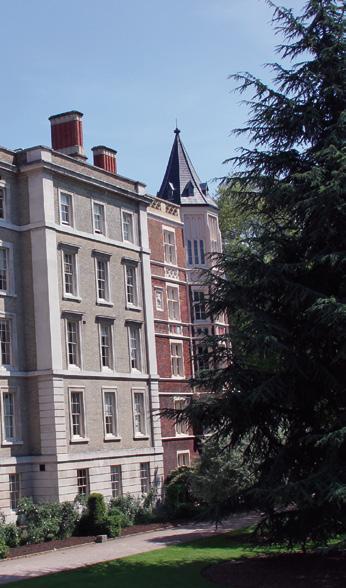
References
Applicants are required to arrange for two references to be included in support of a scholarship application, which can be either academic or professional references. All referees should have known the applicant for at least 6 months, and references should be as detailed as possible. Please note that family members cannot provide references. As part of the application form, applicants will be required to provide the names and contact details for their referees. An automatic email will then be sent to the referees, asking them to upload their reference directly to us.
The scholarships team are unfailingly helpful, diligent and informative. I felt clear about every step of the process, and on what measures we were being assessed.
Gabriel Barton-Singer, 2022 Bar Course Scholar
22 The Inner Temple Career Guide 2022–23
Criteria for Inner Temple Awards
The Inn aims to interview all candidates that apply for a scholarship. Candidates’ application form and interview performance is assessed against the below scholarship criteria, which is used for all Inner Temple Awards. The Inner Temple awards its funds based on merit: that is, the Scholarship Committee’s assessment of the evidence put before them, regarding the applicant’s potential to succeed at the Bar of England and Wales.
1 Academic performance
Evidenced by academic performance at university or academic potential shown through improvements at each academic stage.
2 Advocacy Potential
Deploys precise and wellreasoned arguments, with clarity and fluency. Can demonstrate persuasiveness and conviction, can tailor style to the audience.
3 Legal Comprehension and Reasoning Skills
The ability to analyse complex information; identify material issues; and ability to defend an argument.
4 Professionalism and Interpersonal Skills
Ability to build productive working relationships, treat people with courtesy and respect regardless of their background or circumstances. Responds appropriately to those from diverse backgrounds and to the needs and sensitivities created by individual circumstances.
5 Motivation
A very high level of commitment to a career at the Bar, together with a sound understanding of the profession and any current intended area(s) of practice. Being adaptable and flexible by being self-aware and self-directed.
Financial need assessment
Apart from the Named Top Awards, all other scholarship awards consider the financial need of candidates when determining the sum to be awarded. This is determined by assessing the resources available, the needs that each candidate is likely to have during the specific period of their professional journey, and to see where each candidate fits in the spectrum of candidates.
The criteria for financial need are:
1 Capital/debt (existing and prospective)
2 Income (existing and prospective, from all sources – including any other likely award or provision, e.g. from a public body, prospective pupillage chambers, charity or parents)

3 Personal expenditure (existing and prospective, including fees)
4 Exceptional considerations (e.g. dependants, or special liabilities)
We recommend that all applicants complete the financial statement. While it is not compulsory, if it is not completed, any award received (other than the named awards mentioned above) would be made at the minimum level.
The Inner Temple Career Guide 2022–23 23
GDL Scholarships
Scholarships amounts available In 2023, the Inner Temple will offer £200,500 in GDL scholarships.
Breakdown of awards:
Award Number of Awards Available Amount Available
Princess Royal Scholarship 2 One of £10,000 & one of £7,500
Major Scholarship 4 Budget of £183,000 Awards will be made on merit, then for each successful applicant, financial means will be considered to decide the award amount
Exhibition Scholarships up to 30
Bar Course Scholarships
Scholarship amounts available For 2023 the Inner Temple will have £1,829,808 available for those undertaking the Bar Course
Breakdown of awards:
Bar Course Award Type
Number of Awards Available Value
Peter Taylor Scholarship 1 1 at £22,000
Stephen Chapman Scholarship 1 1 at £21,000
Princess Royal Scholarships 5 5 at £20,000
Major Scholarships 20 £1,666,433
Exhibition Scholarships Approximately 93
Benefactors’ Scholarships and Prizes 18 benefactors’ scholarships will be awarded in conjunction with the exhibition awards £11,625
Duke of Edinburgh Entrance Scholarships 50 at £175 to cover admission and Call fees £8,750
Approximately 120
This is broken down into three types of scholarships:
Top Awards
Major scholarships
Exhibition Awards
These are seven named scholarships that are awarded to those that received the highest marks for their scholarship application and interview against the Inn’s Scholarship Criteria. These scholarships are not means-tested and consist of one Peter Taylor Scholarship of £22,000, one Stephen Chapman Scholarship of £21,000 and five Princess Royal Scholarships of £20,000 each are available
These are the second-tier scholarship awards. 20 of these means-tested scholarships are available.
Approximately 93 means-tested exhibition awards are available to candidates that perform well in their scholarship application and interview.
The Inner Temple Career Guide 2022–2324
Total
£1, 829,808
Disability Awards
Up to £15,000 is available annually to assist disabled students or pupils of the Inner Temple to support a parity of educational experience for disabled people, by covering some of the associated additional costs. This may include but is not limited to: learning support helper; specialist equipment (for example specific software); extra travel costs incurred because of your disability; other disability-related costs of studying. Please note that Inner Temple Disability Awards will not be able to cover costs which any other student/pupil may have, or costs which are not associated with your course/pupillage.
Pupillage Awards
The Inner Temple offer a small number of scholarships for those with a minimally funded pupillage, called Benefactors’ Scholarships. The Marshall Hall Trust will also provide an additional amount to be divided between successful applicants in the form of Marshall Hall Trust Pupillage Awards.


Pegasus Scholarship Trust Award
The Pegasus Scholarship Trust was founded in 1987 by the Rt. Hon Lord Goff of Chievely, as a Charitable Trust supported by all four Inns. The Trust’s aim is to make it possible for ‘gifted young lawyers – the future leaders of their professions – to learn about the practical working of the common law system in countries other than their own.’
The Inner Temple Career Guide 2022–23 25
AND
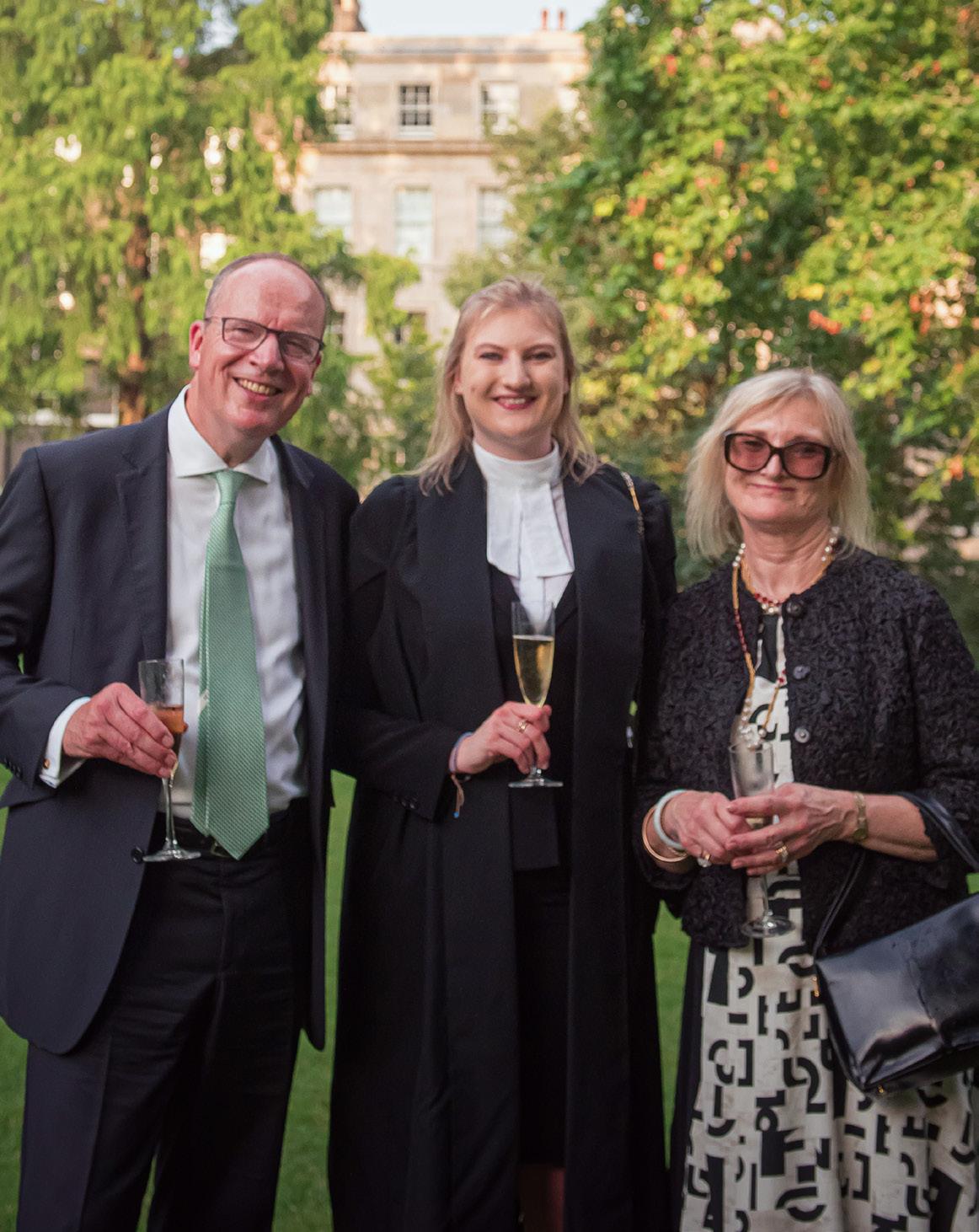
SUPPORT EDUCATION
26
PRE-CALL
PROGRAMME
Pre-Call Education programme
Qualifying Sessions form a vital part of a student’s journey in training to become a barrister. All students who undertake vocational training for the Bar are required to be members of an Inn. Qualifying Sessions, which take place alongside a student's vocational training, provide opportunities for professional and ethical development which complement and build on the learning provided by the Bar Course. They form a vital bridge between academic education and the final component of Bar training: pupillage. Qualifying Sessions also provide opportunities for a student to enhance their understanding of the role of barristers in the wider justice system and the rule of law.
Through the provision of both practical and knowledge-based sessions, delivered by specially selected and trained members of the profession and experts, the Inns help equip students to undertake the next stage of training and to be fit and proper to serve the public as barristers. The links made with the profession through the Inns provide students with a foundation for pupillage and work-based learning but also for a career at the Bar thereafter.
Bar Course students need to secure ten qualifying points before they can be Called to the Bar. Students must attend a minimum of one session under each of the themes outlined below and at least two sessions must be interactive and require preparation in advance. Students can contact the Education and Training Department if they have questions about these requirements.
The Inn’s Qualifying Sessions are spread across five themes. The themes are:
Ethics, Standards and Values; Advocacy Skills; Legal Knowledge, Justice and the Rule of Law; Equality, Diversity and Inclusion; and
Preparation for Pupillage, Career Development and Wellbeing.
The Inn recognises that its student members study the vocational qualification component with providers across England and Wales, and therefore provides a wide range of Qualifying Sessions at weekends as well as during the week. Students at providers outside of London can attend local qualifying sessions.
The Education and Training Department’s annual programme of events is specifically designed to enable student members to develop their legal knowledge, advocacy skills and presentational skills, as well as to offer students opportunities to meet and learn from practising barristers and judges. A few of these are highlighted on the next page.
The Inner Temple Career Guide 2022–23 27
EDUCATION
TYPE OF QUALIFYING SESSIONS
Advocacy and Legal Research Training
This is one of the first Qualifying Sessions of the academic year and gives the Inn’s new student members the opportunity to practise their advocacy skills in a supportive and informal environment before beginning the Bar course.

Foundational Skills Courses
Taught by external professionals, skilled in public speaking and vocal projection, these sessions give students the opportunity to develop their presentational skills, posture and performance, all as a means of improving their oral advocacy.
Student Advocacy Weekends
The Inn hosts three student advocacy weekends a year, at external conference centres.
The weekends offer students the opportunity to hear from high profile speakers and experts in the topic under discussion, as well as the chance to practise their advocacy skills.
Circuit Education Days
These Qualifying Sessions are tailored to students studying at providers outside of London, at a number of urban centres around the country.
In previous years, a significant number of students have attended sessions on ethics, pupillage applications, pitfalls of the early years of practice and clinical negligence.
Lectures
The Inn contributes to cutting edge legal debates through its Lecture Night and Social Context of the Law lectures.
Read more about our Qualifying Sessions at www.innertemple.org.uk/ education/
This event was the most important and useful piece of training I have received from Inner or indeed, anywhere else during my legal career. Thank you for a fantastic day.
The Inner Temple Career Guide 2022–2328
SUPPORT SCHEMES FOR STUDENTS
The following schemes are designed to help our students enhance their experience and learning.
Mentoring Scheme
This is a scheme that pairs students with experienced practising barristers who can give advice and impartial assistance.
Marshalling Scheme
This scheme gives students the opportunity to spend up to a week with a High Court or Circuit Judge either in London or on Circuit.
My mentor was absolutely fantastic and gave me some excellent insight that proved useful in pupillage applications.
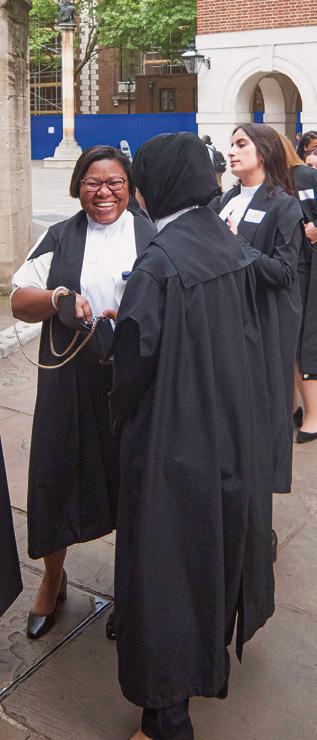
The judge shows students the case papers and discusses the proceedings. The experience provides a valuable opportunity to observe the workings of the court from an entirely different perspective. This scheme is open to students in the second half of their bar course.
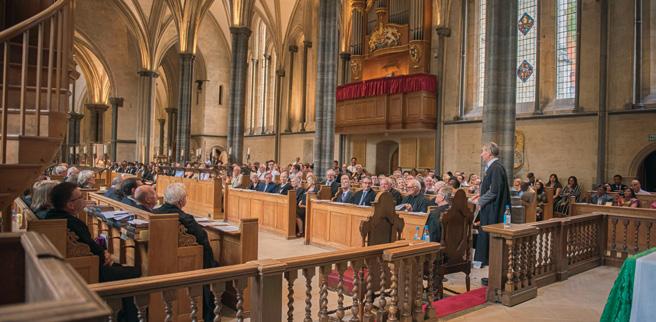
The marshalling scheme has given me a privileged insight into a judge’s reality. I cannot recommend the experience highly enough.

The Inner Temple Career Guide 2022–23 29
Mock Interview Scheme
This scheme aims to help students develop their interview skills in preparation for imminent pupillage interviews. Students are given the opportunity to practise their interview technique and to build up confidence in front of barristers.
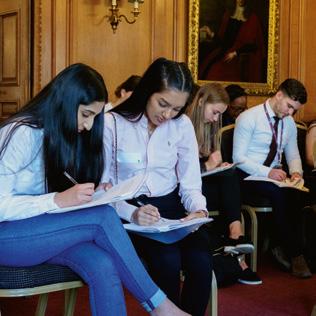
Pupillage Application Support

The mentoring scheme and mock interview scheme are designed to support you as you start to think about next steps in, your career including securing pupillage.
The mock interview was extremely useful and provided very helpful and encouraging feedback.
To complement this, support the Inn runs Advocacy & Pupillage Applications support events. These sessions offer those attending the opportunity to practise advocacy skills, take part in a mock interview and have pupillage applications and legal CVs reviewed. The trainers running the session are from the junior Bar and, as such, have had relatively recent experience of pupillage.
There are also Pupillage Advice Sessions, which aim to assist members in preparation for the next round of pupillage applications.
I think the whole day was excellent, the three activities covered different areas which really helped me feel ready for the application and interview season.
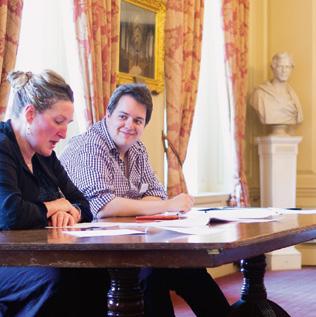
30 The Inner Temple Career Guide 2022–23
STUDENT SOCIETIES
The Inner Temple has four active student societies. They each organise a number of events throughout the year.
Inner Temple Students’ Association (ITSA)
ITSA is one of five Inner Temple student societies. All students are automatically members of ITSA and are invited to all events. The Association promotes collegiality between students and provides a welcome break from studies and the hunt for pupillage.
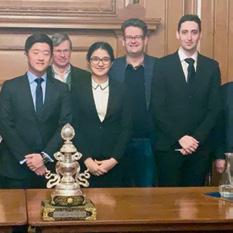


Inner Temple Racial Equality Society (Part of ITSA)
The Racial Equality Society membership is open to any GDL and Bar Course student member who self-identifies as being from a Black, Asian or minority ethnic background. The aim of the society is to facilitate access to the Bar for those from ethnic minority backgrounds and to create a support network for students from backgrounds with the least representation in the profession. The Inner Temple Racial Equality Society sits under the Inner Temple Students Association (ITSA) but has their own committee.
Inner Temple Drama Society
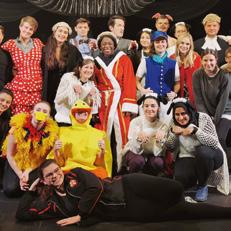
The Society is beneficial to students in many ways: confidence, clarity and projection being just three skills that can help to improve your advocacy.
Past performances have starred actors and actresses from all walks of legal life. With readings from Benchers to leading roles being performed by practising barristers and GDL students, this Society is open to all and is a great way to meet other members of the Inn.
Inner Temple Debating Society
Playing an active part in the Inner Temple Debating Society holds numerous benefits. Teams compete regularly in many of the world’s most prestigious tournaments, including the World and European Championships (held over the Christmas and summer holidays respectively). If selected, the team is fortunate to have travel and registration expenses met by the Inn. In recent years we have sent members to World Championships in India, Ireland, Turkey, Botswana and the Philippines. Debating provides a fantastic opportunity to see places and meet people from all over the world.
Inner Temple Mooting Society
What is mooting?
Moots are legal problems in the form of fictitious cases. Appearing before the Bench are two teams of two counsel – a senior and junior counsel on each. Counsel will routinely be asked a number of questions by the judge(s) relating to their submissions. Of course, winning the moot is not the same as winning the argument. It really is a case of how you play the game rather than whether you win or lose. Inner Temple mooters compete in some of the world’s most prestigious mooting competitions, for example, the Willem C Vis International Commercial Arbitration Law Moot, Thomas A Finlay Moot Court, Intervarsity and the Manfred Lach’s International Space Law Moot among others. In recent years, the Inner Temple has sent its mooters to Vienna, Hungary, Dublin and Washington, DC. Mooting provides a fantastic opportunity to see places and meet people from all over the world.
The Inner Temple Career Guide 2022–23 31
The Association promotes collegiality between students and provides a welcome break from studies and the hunt for pupillage.
POST CALL EDUCATION
The Inner Temple runs an extensive programme of advocacy training for pupils, new practitioners and established practitioners alike. Anyone joining the Inner Temple can look forward to outstanding training from committed trainers. The Inn is fortunate to have a hugely dedicated membership, both barristers and judges, who are willing to give up countless hours in the evenings and over weekends to assist with the training.
An independent report by the Advocacy Training Council (now known as the Inns of Court College of Advocacy), which monitors advocacy training in England and Wales, stated that “…those in charge of advocacy training at Inner Temple are among the most experienced advocacy trainers at the Bar. The use of the Handbooks for Pupils/New Practitioners and Trainers is eloquent testimony to the enormous amount of time, thought and care which goes into the preparation of advocacy training at Inner Temple…”
The Inner Temple Handbook mentioned in the report has become the foundation for a handbook now approved for use here and abroad by the Inns of Court College of Advocacy.
Compulsory Training for Pupils
Once a pupil has begun the first six months of pupillage, he or she must successfully complete an assessed Pupils’ Advocacy Course compulsory training in order to obtain a practising certificate.
The Inner Temple advocacy course is taught by judges, Masters of the Bench and barristers of all levels, who are accredited advocacy trainers for the Inn.
For Pupils starting on or after 1 September 2021, they must also complete negotiation skills and professional ethics.
New Practitioner Programme
After a barrister has completed pupillage and gained tenancy, either in self-employed practice or at the Employed Bar, he or she will become a ‘new practitioner’. In their first threeyears of practice, newly qualified practitioners are required to complete 45 hours of Continuing Professional Development (CPD) including at least nine hours of advocacy training and three hours of ethics training.
The Inn’s New Practitioners programme, which is run twice each year in April and June, provides the highest possible standard of training for barristers in their first three years of tenancy.
New Practitioners’ Advocacy & Ethics Course
This course comprises an ethics evening in London and an intensive advocacy training residential weekend at Wotton House, Surrey. At the core of the weekend is a case allowing criminal and civil new practitioners to gain experience in handling expert witnesses played by accountants and medical doctors. The ethics session provides participants with the opportunity to discuss a range of ethical questions and related issues under the guidance of established practitioners and solicitors, using interactive voting software to provoke discussion. Together, the two parts of the Inn’s New Practitioners Programme provides the full requirement of advocacy and ethics hours.
Continuing Professional Development
On completion of the New Practitioners’ Programme, all practising barristers, whether employed or self-employed, are required to undertake continuing professional development (CPD) each year in order to keep their skills and knowledge up to date.
CPD Events
CPD events at the Inn include lectures by high profile speakers and practical advocacy exercises conducted by the Inn’s trainers. Past sessions have covered topics such as Vulnerable Witnesses, Serious Sexual Offences and Practical Guidance for Appellate Advocacy and Employment Law.
32 The Inner Temple Career Guide 2022–23
WHO’S WHO IN EDUCATION AND TRAINING
Education and Training Department
Treasury Building, Inner Temple, London EC4Y 7HL
020 7797 8208 education@innertemple.org.uk
/TheInnerTemple
/TheInnerTemple
Education and Policy
Struan Campbell Director of Education and Training 020 7797 8214 scampbell@innertemple.org.uk
Julia Armfield Education Programmes Manager 020 7797 8207 jarmfield@innertemple.org.uk
Kerry Upham Regional Education Officer 020 7797 8189 kupham@innertemple.org.uk
Helen Gaskell Education and Support Co-ordinator 020 7797 2386 hgaskell@innertemple.org.uk
Richard Loveridge Education Operations and Project Manager 020 7797 8212 RLoveridge@innertemple.org.uk

Tiffany-Rochelle Louis-Byfield Education Engagement Co-ordinator 020 7797 8257 tlouis-byfield@innertemple.org.uk
Outreach
Stephanie Baughen Widening Access Manager
020 7797 8262
sbaughen@innertemple.org.uk
James Carlberg Outreach Coordinator 020 7797 8240
jcarlberg@innertemple.org.uk
Edwina Koroma
Access and Support Officer 020 7797 8213
EKoroma@innertemple.org.uk
Scholarships and Students
Georgina Everatt Scholarships Manager 020 7797 8211
geveratt@innertemple.org.uk
Shahzadi Hussain Pegasus Trust Co-ordinator 020 7797 8210

shussain@innertemple.org.uk
Professional Training
David Miller Education Programme Manager (Established Practitioners) 020 7797 8209
dmiller@innertemple.org.uk
Vanessa Bennett Education Programme Manager (Pupils and New Practitioners)
020 7797 8261
vbennett@innertemple.org.uk
Mercy Quaynor Education Co-ordinator 020 7797 8253 mquaynor@innertemple.org.uk
Design: wearenoun.com Print: Harvest Communications Ltd
33The Inner Temple Career Guide 2022–23

innertemple.org.uk / education














































